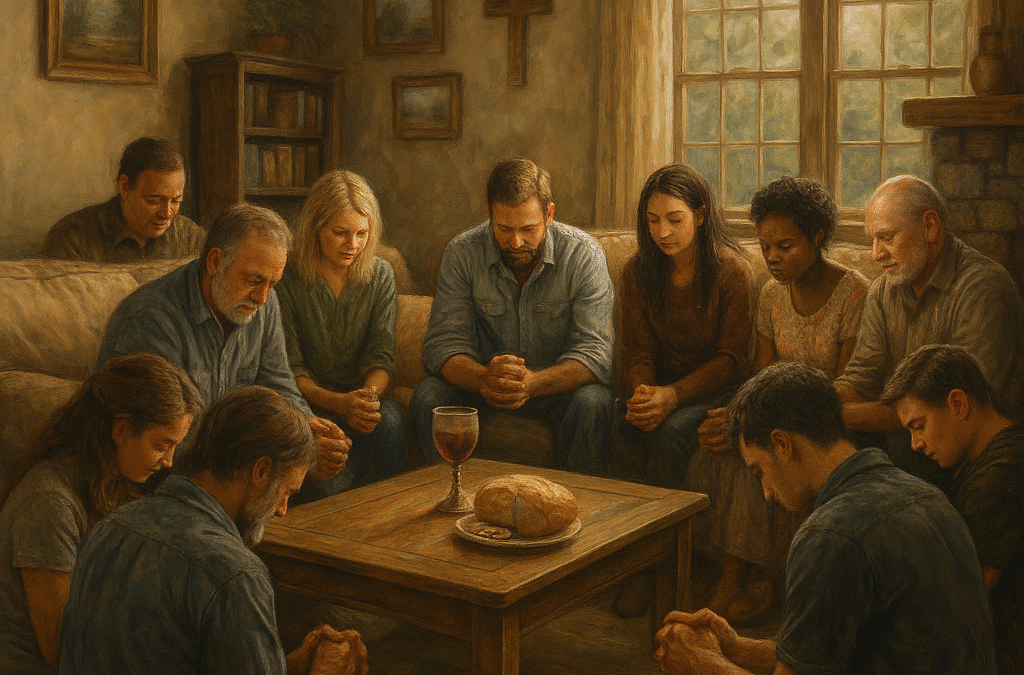When Church Moved Into the Living Room
A Personal Story of Rediscovering Real Faith
In those days, church was just “doing church.”
We’d get up on Sunday morning, put on our good clothes, go listen to five songs and a lecture, then come home.
I’m sure there were sermons that were inspiring.
We got to know a few people.
But nothing really stuck.
There had to be more.
This couldn’t possibly be all that God intended for Christianity.
It couldn’t possibly be all there is to faith.
It couldn’t possibly be all there is to God.
I wanted to know Him in a real way.
I wanted to know who He really is.
But the church had no real life.
The singing was polished, the preaching was passionate, the programs were well-run—
But it all felt hollow.
Relationships were shallow.
And if we didn’t return, the relationships faded.
We visited other churches—some better than others.
We found great preachers, good people.
But that sense of family, of purpose, of living faith… it wasn’t there.
So we stepped away.
A few families, like ours, were frustrated with how church was operating.
It wasn’t that we were bitter or rebellious—
We just couldn’t find what our hearts were hungry for.
We knew we needed spiritual connection, even if it didn’t come in the form we were used to.
So we got together.
Just a couple families—husbands, wives, and kids.
We started simply:
Sharing some of our struggles, then opening the Bible together.
There were no sermons.
No structured curriculum.
Usually someone would show up with a scripture or topic on their heart,
And we’d just start talking.
It was informal, but not shallow.
Spirit-led, but not chaotic.
We met on Sunday afternoons or evenings—
When everyone could relax, bring a snack, and bring their full selves.
And something began to grow.
Not just spiritual insight—
But relationships.
The kind traditional church often doesn’t have room for.
We shared our homes, our kids, our food, and our lives.
Over time, some of those relationships became the most meaningful we’ve ever had.
We talked about marriage, child-rearing, money, fear, calling, and failure.
We dug into the Bible—
Not because someone told us to,
But because we wanted to.
Some weeks it felt like the Holy Spirit Himself was guiding our questions,
Revealing truth none of us expected.
I started to pray more.
And I started to know God in ways I never had before.
My faith became real and personal in a way that never happened for me in the structure of Sunday services.
“I’ve grown more in the past few months sitting in this living room than in years of sermons.”
That season changed me.
It made me hungry for that kind of shared spiritual life all the time.
I’ve looked for it since,
But often “home church” ends up being a smaller version of the very system we were stepping away from.
What we had back then wasn’t about creating a church or running a ministry—
It was simply a space to be the Church together.
We didn’t need a platform or a plan.
We needed presence—God’s, and each other’s.
We needed time, conversation, and the freedom to ask questions out loud.
And the Spirit met us there.
I can read the Bible alone—
And every preacher says we need to.
But nothing compares to opening the Scriptures together.
Learning, digging, praying, struggling, listening…
It is so much more than daily devotions alone and lost.
The house of the Lord is built using all of us as stones.
Faith was never intended to be walked alone.
That’s why I believe so strongly in this call to rediscover participatory, Spirit-led teaching.
I’ve lived it.
I’ve tasted it.
And once you’ve experienced it, you know—
This is what Church was meant to be.




